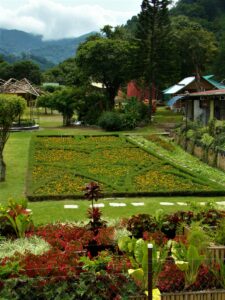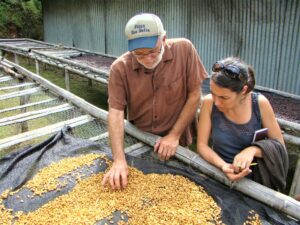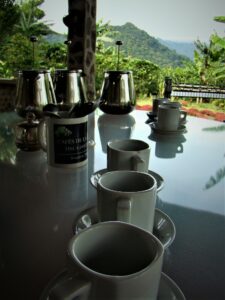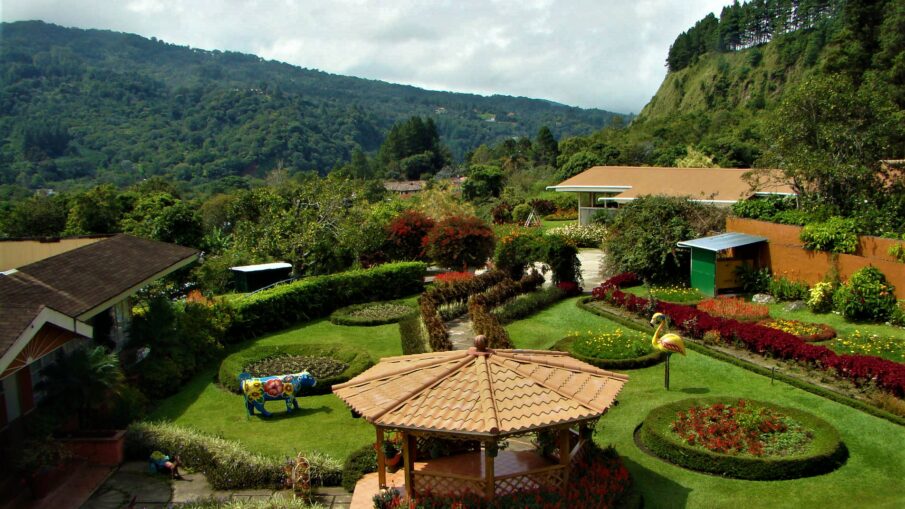At first glance, a location just north of the equator in Central America seems the unlikeliest of spots for finding flowering hillsides and comfortable temperatures. That relentless sun and year-around heat would wither even the hardiest floral varieties, right?
Wrong.
A hamlet in the mountains of Panama hosts an event called the Boquete Flower and Coffee Festival every January. Boquete, at an elevation of about 3,900 ft. above sea level, rarely records temperatures above 85°F. A typical high temperature might be 75°F, with cool evenings in the 55°F range. Rainy seasons come and go, but temperatures stay constant throughout the year.
It’s a great climate for cultivating and showing what is billed as a festival display of 30,000 flowers. The interest has grown as Boquete has become increasingly popular as a retirement destination. Magazines such as Forbes and Modern Maturity have named Boquete a prime re-location spot for North Americans. English is nearly as widely spoken here as Spanish. 
Perhaps it’s a stretch to call Boquete a surprising travel find, but at least two places in this intriguing town fit the description.
The first is a private home adorned with one of the finest gardens you will ever see in such a setting.
You enter under an arched gate that proclaims Mi Casa es Su Casa (My Home is Your Home). This is both a private home and a public garden.
Over the years, the original owners of the property created a series of gardens and exhibits. Some estimate there are 200 species of plant life here, much of it the flowering variety. The painstaking care of the gardeners is obvious in the first few steps inside that gate.
During our visit in 2011, the owner had vacated the property, but caretakers were at work doing the weeding and watering. He lived to the ripe old age of 100 before passing on. He derived great pleasure from showing all those ex-pats, and anyone else with an interest, his beautiful gardens. For that reason, he never charged anyone to enter and walk around the place. The house itself was off-limits but the gardens and even an observation tower complete with spiral staircase were open to visitors.
Since our visit, the property has been sold and changes have been made. There is now a small restaurant in the former family house, and it’s possible that by the time you visit there might be a small admission charge. If so, pay it. Walk up the main street in Boquete past the Baptist Church and then take the fork to the left. You’ll see the gardens and the arch.
The second element in the Boquete festival is coffee.
It shouldn’t be much of a surprise to find coffee growing here. After all, Panama produces some of the most-awarded coffee in the world. Places like Columbia and Peru grow coffee beans in much greater volume. Panama prides itself on quality rather than quantity.
American ex-pats Rich Lipner and Dee Harris bought a coffee plantation here in an effort to escape the rat race in California. Rich admits that he started out with a lot to learn. But over time, area growers began to share their knowledge with him. He has developed seven Arabica varieties and has won awards for his creations. His Panamanian business, Finca Dos Jefes, now markets coffee throughout the United States and Canada.
Unlike Mi Casa es Su Casa, a tour of Finca Dos Jefes is not free. It will cost $30, and reservations can be booked online. There is value in the price. You’ll receive a unique look at the coffee business in English and transportation between the plantation and the center of Boquete. The owners donate a portion of profits to benefit local schools.
The tour includes a look at the beans before and after drying, and a look at how they are roasted.  It’s not everyday they you have the opportunity to drink coffee in the very place the beans were grown and roasted.
It’s not everyday they you have the opportunity to drink coffee in the very place the beans were grown and roasted.
To be sure, there is more to Boquete than flowers and coffee beans. The population has grown steadily in the past 20 years, and that “hamlet in the mountains” description might not always apply. For now, the town is doing a good job of preserving its carefree ambiance, and is firmly on the radar of people who enjoy mild climate, freedom from the brunt of hurricanes, and a simpler life.
It’s not always a restful lifestyle.
Many visitors arrive to participate in canopy tours, also known as zip lining. Canopy refers to the tops of trees in the jungle, which botanists started surveying years ago in Central America with the aid of metal cables and harnesses anchored between trees. It’s an exhilarating feeling to glide between trees. Boquete Tree Tour is recommended for those who are interested. You’ll traverse 4.5 kilometers (2.7 mi.) in the air on 12 different segments.
Hiking, mountain biking, kayaking and rafting also are popular.
Don’t miss out on the adventure travel experiences. But if you miss the January festival, remember that Boquete offers you that surprising combination of flowers and coffee in all seasons.
If You Go

